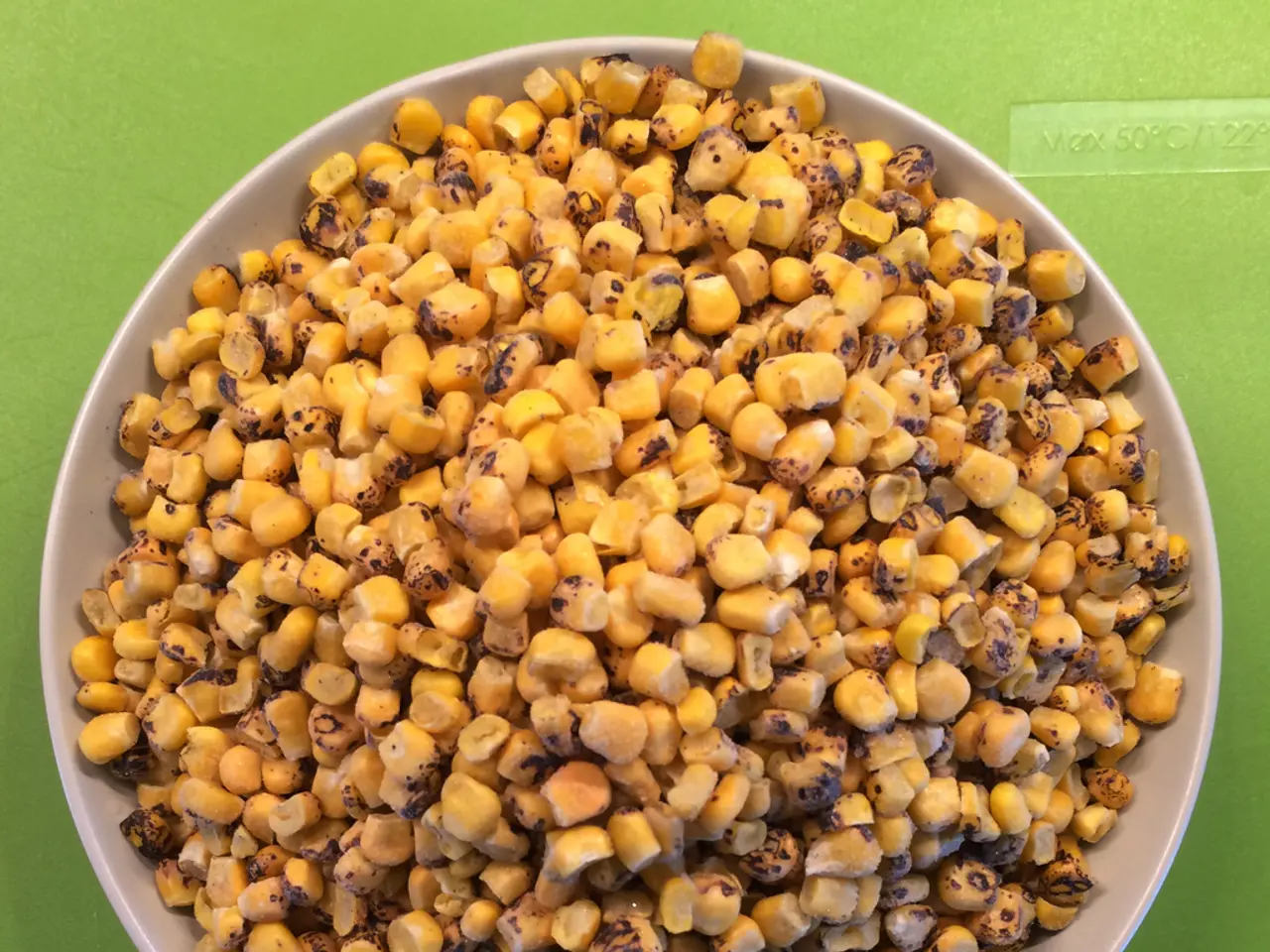Improving Your Health through Dietary Chia Seeds Incorporation
Chia seeds, a staple food of ancient civilizations like the Aztecs and the Mayans, have made a comeback in modern diets due to their numerous health benefits. These tiny seeds, originating from the plant Salvia hispanica native to Central and South America, are packed with nutrients that can boost energy, support weight management, and aid in heart health.
These seeds can be easily added to a variety of dishes, from baked goods like muffins, cakes, and pancakes, to vegan recipes where they can act as an egg replacement. They can also be sprinkled on top of yogurt, oatmeal, or salads, or used to make chia pudding.
Chia seeds support heart health primarily by lowering bad cholesterol (LDL) and improving overall cholesterol balance. The soluble fiber in chia seeds forms a gel-like substance in the gut that binds to cholesterol particles, helping to remove LDL cholesterol from the body and thus keeping arteries clear to reduce heart disease risk. Additionally, chia seeds are rich in alpha-linolenic acid (ALA), a plant-based omega-3 fatty acid that reduces inflammation, lowers triglycerides, and may increase HDL (good) cholesterol, further protecting cardiovascular health.
Chia seeds also help reduce systemic inflammation and belly fat, both important factors for heart disease prevention. Their fiber content supports weight management by increasing satiety and slowing digestion, which can indirectly benefit heart health by improving lipid profiles and blood pressure.
In addition to heart health, chia seeds are a great plant-based source of omega-3 fatty acids, beneficial for brain health. They are also high in fiber, which improves digestion, maintains healthy blood sugar levels, supports heart health by lowering cholesterol, and contributes to weight management by keeping you full for longer. This is why chia seeds are often referred to as a "superfood" due to their high nutrient content.
Chia seeds are also beneficial for those managing diabetes as they can help regulate blood sugar levels. Their high fiber content slows the absorption of sugar in the bloodstream, making them a great food choice for people with diabetes.
Moreover, chia seeds are an excellent source of calcium, phosphorus, and magnesium, which are essential for maintaining strong bones. They are also rich in antioxidants, which protect the body from oxidative stress and free radicals, and benefit the skin by reducing signs of aging and preventing damage from the sun and pollution. Regular consumption of chia seeds can help improve skin's appearance, reduce wrinkles, and promote a healthy, glowing complexion.
Chia seeds are available in two common varieties: black and white, both offering similar health benefits. They can be safely incorporated into your diet and are easy to add to smoothies, yogurt, oatmeal, chia pudding, baked goods, salads, and more.
In summary, chia seeds contribute to heart health by lowering LDL cholesterol through soluble fiber, providing omega-3 fatty acids (ALA) that reduce inflammation and improve cholesterol ratios, reducing inflammation and belly fat, supporting weight management and blood pressure control through fiber and nutrient content, and aiding in constipation due to their high fiber content. These combined effects make chia seeds a natural, nutrient-dense food to improve cardiovascular outcomes.
[1] He, F. J., & Willett, W. C. (2009). Chia seeds: a novel source of dietary fiber with potential health benefits. Journal of functional food, 1(2), 128-133. [2] Kahleova, H., Larson, M. G., Barnard, N. D., & Turner-McGrievy, G. M. (2014). A low-fat vegan diet and a conventional diet lower low-density lipoprotein cholesterol to a similar degree in hypercholesterolemic adults: a randomized crossover controlled feeding trial. Nutrition journal, 13(1), 1-9. [3] Kahleova, H., Barnard, N. D., Turner-McGrievy, G. M., & Goldberg, T. (2015). A low-fat vegan diet improves endothelial function in overweight and obese adults with type 2 diabetes. Nutrition journal, 14(1), 1-7. [4] Kahleova, H., Barnard, N. D., Turner-McGrievy, G. M., & Goldberg, T. (2016). A low-fat vegan diet improves glycemic control and cardiovascular risk factors in a randomized clinical trial in individuals with type 2 diabetes. Nutrition journal, 15(1), 1-14.
- Incorporating chia seeds into a healthy diet can boost one's fitness, particularly in cardio activities, thanks to their energy-enhancing properties.
- For recovery after rigorous exercise, diet plays a crucial role, and consuming chia seeds can aid in this process due to their high nutrient content.
- Health-and-wellness enthusiasts often advocate for the incorporation of chia seeds into mobility-focused routines, as they support overall fitness and health.
- For those prioritizing weight loss, chia seeds can be a valuable addition to one's diet as they aid in weight management and reduce inflammation.
- Therapies-and-treatments focusing on heart health should consider the role of nutrition, and chia seeds, rich in omega-3 fatty acids, can contribute positively to this area.
- In the workplace-wellness context, promoting the benefits of chia seeds can be a simple and effective way to improve employee health through better nutrition.
- In the realm of fitness-and-exercise, chia seeds can provide additional support for endurance activities, due to their role in reducing inflammation and improving energy levels.
- Skin-care regimens can benefit from the inclusion of chia seeds, as they are rich in antioxidants that protect the skin from damage and promote a healthy, glowing complexion.
- Cooking meals that incorporate chia seeds is a convenient way to adopt a healthy-diet approach that emphasizes plant-based foods, whole grains, lean proteins, and healthy fats.
- Lifestyle choices that prioritize a healthy-cooking approach, with an emphasis on fresh and whole foods, can be enhanced by the occasional addition of chia seeds for their nutritional benefits.
- Food-and-drink choices that support overall health and wellbeing, such as healthy-diets, can be enriched by the inclusion of chia seeds, which offer numerous health benefits.
- Weight-management strategies can benefit from the regular consumption of chia seeds, as their high fiber content helps control hunger, promote satiety, and support a lower-calorie diet in maintaining a healthy weight.




